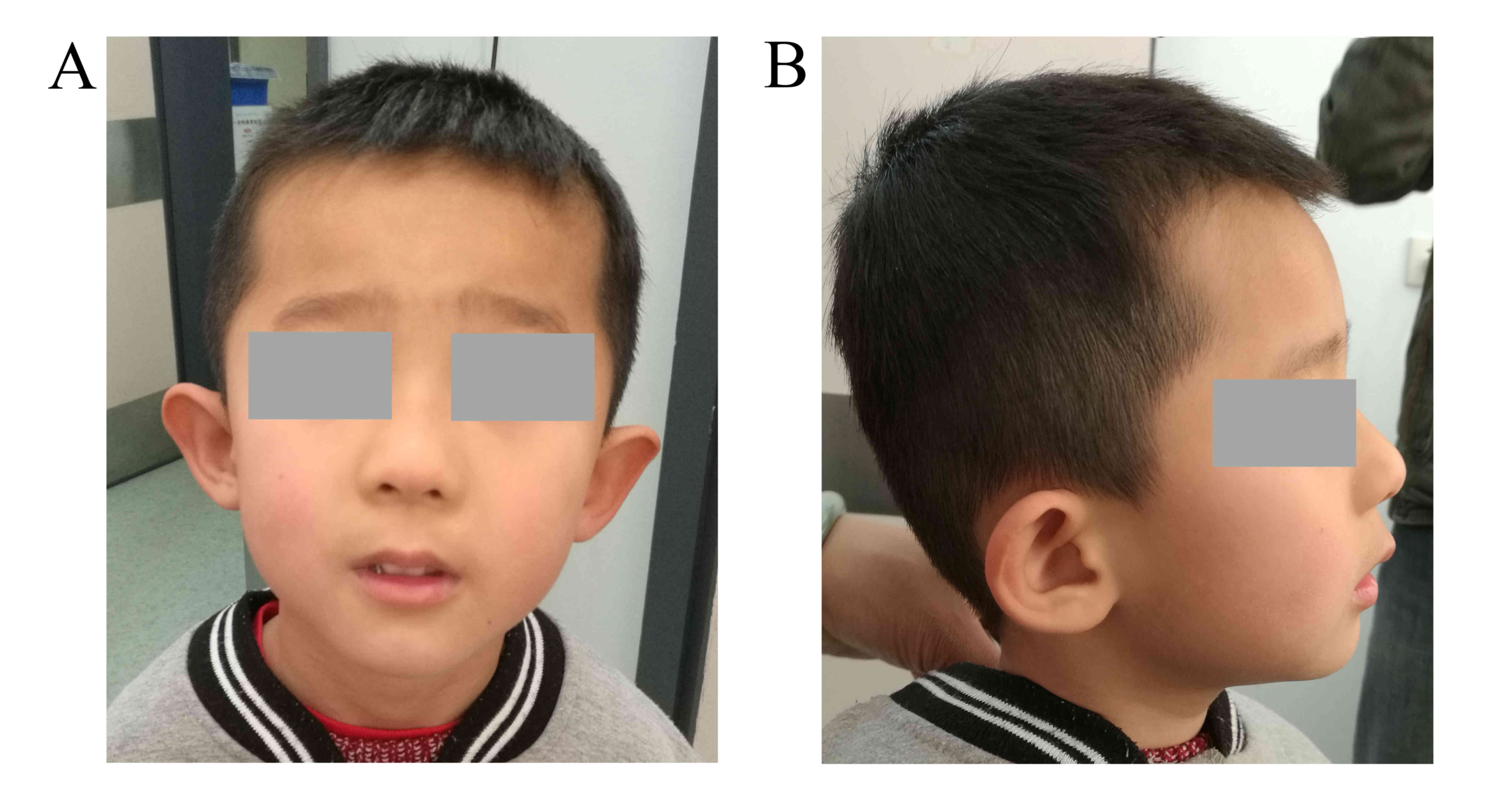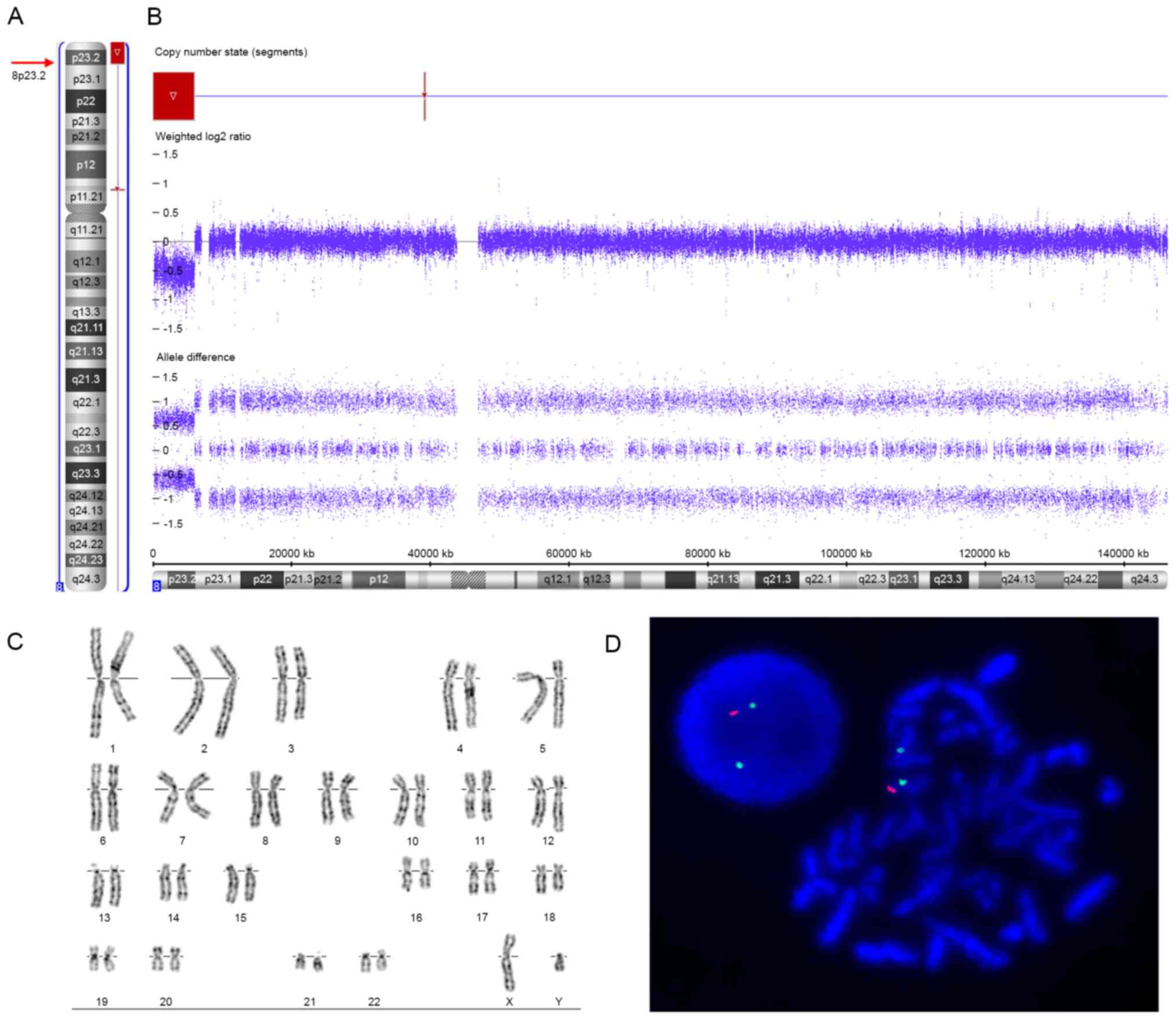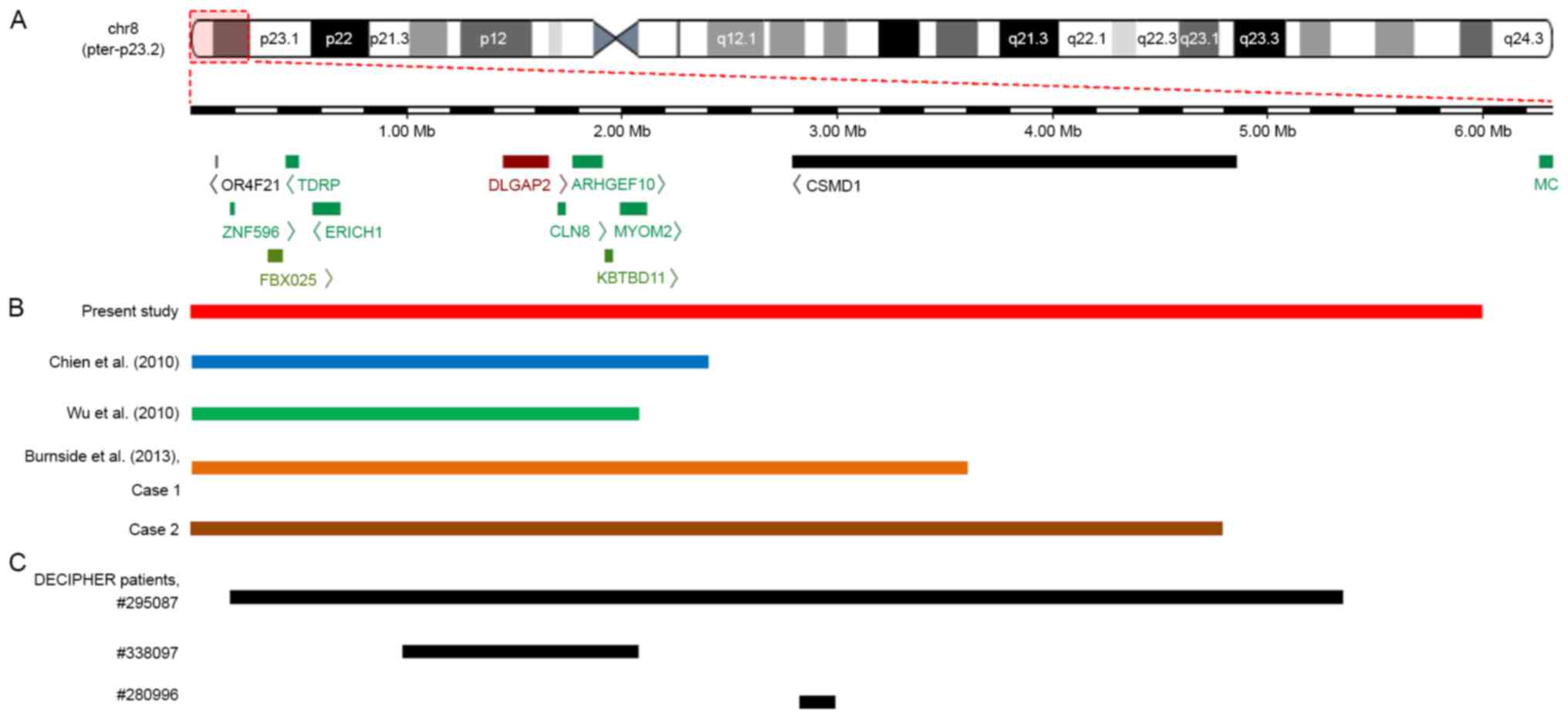|
1
|
Hollox EJ, Barber JC, Brookes AJ and
Armour JA: Defensins and the dynamic genome: What we can learn from
structural variation at human chromosome band 8p23.1. Genome Res.
18:1686–1697. 2008. View Article : Google Scholar : PubMed/NCBI
|
|
2
|
Yu S, Fiedler S, Stegner A and Graf WD:
Genomic profile of copy number variants on the short arm of human
chromosome 8. Eur J Hum Genet. 18:1114–1120. 2010. View Article : Google Scholar : PubMed/NCBI
|
|
3
|
Rowe LR, Lee JY, Rector L, Kaminsky EB,
Brothman AR, Martin CL and South ST: U-type exchange is the most
frequent mechanism for inverted duplication with terminal deletion
rearrangements. J Med Genet. 46:694–702. 2009. View Article : Google Scholar : PubMed/NCBI
|
|
4
|
Páez MT, Yamamoto T, Hayashi K, Yasuda T,
Harada N, Matsumoto N, Kurosawa K, Furutani Y, Asakawa S, Shimizu N
and Matsuoka R: Two patients with atypical interstitial deletions
of 8p23.1: Mapping of phenotypical traits. Am J Med Genet A.
146A:1–1165. 2008. View Article : Google Scholar : PubMed/NCBI
|
|
5
|
Ballarati L, Cereda A, Caselli R,
Selicorni A, Recalcati MP, Maitz S, Finelli P, Larizza L and
Giardino D: Genotype-phenotype correlations in a new case of 8p23.1
deletion and review of the literature. Eur J Med Genet. 54:55–59.
2011. View Article : Google Scholar : PubMed/NCBI
|
|
6
|
García-Santiago FA, Martínez-Glez V,
Santos F, García-Minañr S, Mansilla E, Meneses AG, Rosell J,
Granero ÁP, Vallespín E, Fernández L, et al: Analysis of
invdupdel(8p) rearrangement: Clinical, cytogenetic and molecular
characterization. Am J Med Genet A. 167A:1–1025. 2015.PubMed/NCBI
|
|
7
|
Burnside RD, Pappas JG, Sacharow S,
Applegate C, Hamosh A, Gadi IK, Jaswaney V, Keitges E, Phillips KK,
Potluri VR, et al: Three cases of isolated terminal deletion of
chromosome 8p without heart defects presenting with a mild
phenotype. Am J Med Genet A. 161A:1–828. 2013.PubMed/NCBI
|
|
8
|
Wat MJ, Shchelochkov OA, Holder AM, Breman
AM, Dagli A, Bacino C, Scaglia F, Zori RT, Cheung SW, Scott DA and
Kang SH: Chromosome 8p23.1 deletions as a cause of complex
congenital heart defects and diaphragmatic hernia. Am J Med Genet
A. 149A:1–1677. 2009. View Article : Google Scholar
|
|
9
|
Devriendt K, Matthijs G, Van Dael R,
Gewillig M, Eyskens B, Hjalgrim H, Dolmer B, McGaughran J,
Bröndum-Nielsen K, Marynen P, et al: Delineation of the critical
deletion region for congenital heart defects, on chromosome 8p23.1.
Am J Hum Genet. 64:1119–1126. 1999. View
Article : Google Scholar : PubMed/NCBI
|
|
10
|
Molck MC, Monteiro FP, Simioni M and
Gil-da-Silva-Lopes VL: 8p23.1 interstitial deletion in a patient
with congenital cardiopathy, neurobehavioral disorders and minor
signs suggesting 22q11.2 deletion syndrome. J Dev Behav Pediatr.
36:544–548. 2015.PubMed/NCBI
|
|
11
|
Longoni M, Lage K, Russell MK, Loscertales
M, Abdul-Rahman OA, Baynam G, Bleyl SB, Brady PD, Breckpot J, Chen
CP, et al: Congenital diaphragmatic hernia interval on chromosome
8p23.1 characterized by genetics and protein interaction networks.
Am J Med Genet A. 158A:1–3158. 2012. View Article : Google Scholar : PubMed/NCBI
|
|
12
|
Wat MJ, Beck TF, Hernández-García A, Yu Z,
Veenma D, Garcia M, Holder AM, Wat JJ, Chen Y, Mohila CA, et al:
Mouse model reveals the role of SOX7 in the development of
congenital diaphragmatic hernia associated with recurrent deletions
of 8p23.1. Hum Mol Genet. 21:4115–4125. 2012. View Article : Google Scholar : PubMed/NCBI
|
|
13
|
Keitges EA, Pasion R, Burnside RD, Mason
C, Gonzalez-Ruiz A, Dunn T, Masiello M, Gebbia JA, Fernandez CO and
Risheg H: Prenatal diagnosis of two fetuses with deletions of
8p23.1, critical region for congenital diaphragmatic hernia and
heart defects. Am J Med Genet A. 161A:1–1758. 2013.PubMed/NCBI
|
|
14
|
Garshasbi M, Motazacker MM, Kahrizi K,
Behjati F, Abedini SS, Nieh SE, Firouzabadi SG, Becker C,
Rüschendorf F, Nurnberg P, et al: SNP array-based homozygosity
mapping reveals MCPH1 deletion in family with autosomal recessive
mental retardation and mild microcephaly. Hum Genet. 118:708–715.
2006. View Article : Google Scholar : PubMed/NCBI
|
|
15
|
Jackson AP, Eastwood H, Bell SM, Adu J,
Toomes C, Carr IM, Roberts E, Hampshire DJ, Crow YJ, Mighell AJ, et
al: Identification of microcephalin, a protein implicated in
determining the size of the human brain. Am J Hum Genet.
71:136–142. 2002. View
Article : Google Scholar : PubMed/NCBI
|
|
16
|
Faheem M, Naseer MI, Rasool M, Chaudhary
AG, Kumosani TA, Ilyas AM, Pushparaj P, Ahmed F, Algahtani HA,
Al-Qahtani MH and Jamal H Saleh: Molecular genetics of human
primary microcephaly: An overview. BMC Med Genomics. 8 Suppl
1:S42015. View Article : Google Scholar : PubMed/NCBI
|
|
17
|
Chien WH, Gau SS, Wu YY, Huang YS, Fang
JS, Chen YJ, Soong WT, Chiu YN and Chen CH: Identification and
molecular characterization of two novel chromosomal deletions
associated with autism. Clin Genet. 78:449–456. 2010. View Article : Google Scholar : PubMed/NCBI
|
|
18
|
Nucaro A, Pisano T, Chillotti I, Montaldo
C and Pruna D: Chromosome 8p23. 2-pter: A critical region for
mental retardation, autism and epilepsy? Clin Genet. 79:394–396.
2011. View Article : Google Scholar : PubMed/NCBI
|
|
19
|
Wu Y, Ji T, Wang J, Xiao J, Wang H, Li J,
Gao Z, Yang Y, Cai B, Wang L, et al: Submicroscopic subtelomeric
aberrations in Chinese patients with unexplained developmental
delay/mental retardation. BMC Med Genet. 11:722010. View Article : Google Scholar : PubMed/NCBI
|
|
20
|
Reddy KS: A paternally inherited terminal
deletion, del(8)(p23.1)pat, detected prenatally in an amniotic
fluid sample: A review of deletion 8p23.1 cases. Prenat Diagn.
19:868–872. 1999. View Article : Google Scholar : PubMed/NCBI
|
|
21
|
Giglio S, Graw SL, Gimelli G, Pirola B,
Varone P, Voullaire L, Lerzo F, Rossi E, Dellavecchia C, Bonaglia
MC, et al: Deletion of a 5-cM region at chromosome 8p23 is
associated with a spectrum of congenital heart defects.
Circulation. 102:432–437. 2000. View Article : Google Scholar : PubMed/NCBI
|
|
22
|
Claeys I, Holvoet M, Eyskens B,
Adriaensens P, Gewillig M, Fryns JP and Devriendt K: A recognisable
behavioural phenotype associated with terminal deletions of the
short arm of chromosome 8. Am J Med Genet. 74:515–520. 1997.
View Article : Google Scholar : PubMed/NCBI
|
|
23
|
Novo-Filho GM, Montenegro MM, Zanardo ÉA,
Dutra RL, Dias AT, Piazzon FB, Costa TV, Nascimento AM, Honjo RS,
Kim CA, et al: Subtelomeric copy number variations: The importance
of 4p/4q deletions in patients with congenital anomalies and
developmental disability. Cytogenet Genome Res. 149:241–246. 2016.
View Article : Google Scholar : PubMed/NCBI
|
|
24
|
Jeong HS, Jung ES, Sim YJ, Kim SJ, Jang
JW, Hong KS, Lee WY, Chung HM, Park KT, Jung YS, et al: Fbxo25
controls Tbx5 and Nkx2-5 transcriptional activity to regulate
cardiomyocyte development. Biochim Biophys Acta. 1849:709–721.
2015. View Article : Google Scholar : PubMed/NCBI
|
|
25
|
Li JM, Lu CL, Cheng MC, Luu SU, Hsu SH and
Chen CH: Exonic resequencing of the DLGAP3 gene as a candidate gene
for schizophrenia. Psychiatry Res. 208:84–87. 2013. View Article : Google Scholar : PubMed/NCBI
|
|
26
|
Li JM, Lu CL, Cheng MC, Luu SU, Hsu SH, Hu
TM, Tsai HY and Chen CH: Role of the DLGAP2 gene encoding the
SAP90/PSD-95-associated protein 2 in schizophrenia. PLoS One.
9:e853732014. View Article : Google Scholar : PubMed/NCBI
|
|
27
|
Chien WH, Gau SS, Liao HM, Chiu YN, Wu YY,
Huang YS, Tsai WC, Tsai HM and Chen CH: Deep exon resequencing of
DLGAP2 as a candidate gene of autism spectrum disorders. Mol
Autism. 4:262013. View Article : Google Scholar : PubMed/NCBI
|
|
28
|
Pinto D, Pagnamenta AT, Klei L, Anney R,
Merico D, Regan R, Conroy J, Magalhaes TR, Correia C, Abrahams BS,
et al: Functional impact of global rare copy number variation in
autism spectrum disorders. Nature. 466:368–372. 2010. View Article : Google Scholar : PubMed/NCBI
|
|
29
|
Wu K, Hanna GL, Easter P, Kennedy JL,
Rosenberg DR and Arnold PD: Glutamate system genes and brain volume
alterations in pediatric obsessive-compulsive disorder: A
preliminary study. Psychiatry Res. 211:214–220. 2013. View Article : Google Scholar : PubMed/NCBI
|
|
30
|
Vantaggiato C, Redaelli F, Falcone S,
Perrotta C, Tonelli A, Bondioni S, Morbin M, Riva D, Saletti V,
Bonaglia MC, et al: A novel CLN8 mutation in late-infantile-onset
neuronal ceroid lipofuscinosis (LINCL) reveals aspects of CLN8
neurobiological function. Hum Mutat. 30:1104–1116. 2009. View Article : Google Scholar : PubMed/NCBI
|
|
31
|
Katata Y, Uematsu M, Sato H, Suzuki S,
Nakayama T, Kubota Y, Kobayashi T, Hino-Fukuyo N, Saitsu H and Kure
S: Novel missense mutation in CLN8 in late infantile neuronal
ceroid lipofuscinosis: The first report of a CLN8 mutation in
Japan. Brain Dev. 38:341–345. 2016. View Article : Google Scholar : PubMed/NCBI
|
|
32
|
Allen NM, O'HIci B, Anderson G, Nestor T,
Lynch SA and King MD: Variant late-infantile neuronal ceroid
lipofuscinosis due to a novel heterozygous CLN8 mutation and de
novo 8p23.3 deletion. Clin Genet. 81:602–604. 2012. View Article : Google Scholar : PubMed/NCBI
|
|
33
|
Verhoeven K, De Jonghe P, Van de Putte T,
Nelis E, Zwijsen A, Verpoorten N, De Vriendt E, Jacobs A, Van
Gerwen V, Francis A, et al: Slowed conduction and thin myelination
of peripheral nerves associated with mutant rho Guanine-nucleotide
exchange factor 10. Am J Hum Genet. 73:926–932. 2003. View Article : Google Scholar : PubMed/NCBI
|
|
34
|
Jungerius BJ, Hoogendoorn ML, Bakker SC,
Van't Slot R, Bardoel AF, Ophoff RA, Wijmenga C, Kahn RS and Sinke
RJ: An association screen of myelin-related genes implicates the
chromosome 22q11 PIK4CA gene in schizophrenia. Mol Psychiatry.
13:1060–1068. 2008. View Article : Google Scholar : PubMed/NCBI
|
|
35
|
Donohoe G, Walters J, Hargreaves A, Rose
EJ, Morris DW, Fahey C, Bellini S, Cummins E, Giegling I, Hartmann
AM, et al: Neuropsychological effects of the CSMD1 genome-wide
associated schizophrenia risk variant rs10503253. Genes Brain
Behav. 12:203–209. 2013. View Article : Google Scholar : PubMed/NCBI
|
|
36
|
Kraus DM, Elliott GS, Chute H, Horan T,
Pfenninger KH, Sanford SD, Foster S, Scully S, Welcher AA and
Holers VM: CSMD1 is a novel multiple domain complement-regulatory
protein highly expressed in the central nervous system and
epithelial tissues. J Immunol. 176:4419–4430. 2006. View Article : Google Scholar : PubMed/NCBI
|
|
37
|
Glancy M, Barnicoat A, Vijeratnam R, de
Souza S, Gilmore J, Huang S, Maloney VK, Thomas NS, Bunyan DJ,
Jackson A and Barber JC: Transmitted duplication of 8p23.1–8p23.2
associated with speech delay, autism and learning difficulties. Eur
J Hum Genet. 17:37–43. 2009. View Article : Google Scholar : PubMed/NCBI
|
|
38
|
Havik B, Le Hellard S, Rietschel M, Lybaek
H, Djurovic S, Mattheisen M, Muhleisen TW, Degenhardt F, Priebe L,
Maier W, et al: The complement control-related genes CSMD1 and
CSMD2 associate to schizophrenia. Biol Psychiatry. 70:35–42. 2011.
View Article : Google Scholar : PubMed/NCBI
|
|
39
|
Shimizu A, Asakawa S, Sasaki T, Yamazaki
S, Yamagata H, Kudoh J, Minoshima S, Kondo I and Shimizu N: A novel
giant gene CSMD3 encoding a protein with CUB and sushi multiple
domains: A candidate gene for benign adult familial myoclonic
epilepsy on human chromosome 8q23.3-q24.1. Biochem Biophys Res
Commun. 309:143–154. 2003. View Article : Google Scholar : PubMed/NCBI
|
|
40
|
Trimborn M, Bell SM, Felix C, Rashid Y,
Jafri H, Griffiths PD, Neumann LM, Krebs A, Reis A, Sperling K, et
al: Mutations in microcephalin cause aberrant regulation of
chromosome condensation. Am J Hum Genet. 75:261–266. 2004.
View Article : Google Scholar : PubMed/NCBI
|
|
41
|
Wu N, Ming X, Xiao J, Wu Z, Chen X,
Shinawi M, Shen Y, Yu G, Liu J, Xie H, et al: TBX6 null variants
and a common hypomorphic allele in congenital scoliosis. N Engl J
Med. 372:341–350. 2015. View Article : Google Scholar : PubMed/NCBI
|

















